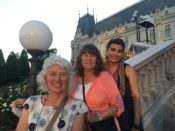 Immersive Academics and Arts
Immersive Academics and Arts Discovering the Wisdom of Childhood
Discovering the Wisdom of Childhood Grade Level Training in Southern California
Grade Level Training in Southern California The Journey is Everything
The Journey is Everything Bringing Love to Learning for a Lifetime
Bringing Love to Learning for a Lifetime The Art of Administration and Leadership
The Art of Administration and Leadership Waldorf EC Training & Intensives in Canada
Waldorf EC Training & Intensives in Canada Association for a Healing Education
Association for a Healing Education Art of Teaching Summer Courses 2025
Art of Teaching Summer Courses 2025 Caring for All Stages of Life
Caring for All Stages of Life Transforming Voices Worldwide
Transforming Voices Worldwide Bay Area Teacher Training
Bay Area Teacher Training Train to Teach in Seattle
Train to Teach in Seattle Apply Today: New Cohort Starts Nov. 2025
Apply Today: New Cohort Starts Nov. 2025 ~ Ensoul Your World With Color ~
~ Ensoul Your World With Color ~ Roadmap to Literacy Books & Courses
Roadmap to Literacy Books & Courses Waldorf-inspired Homeschool Curriculum
Waldorf-inspired Homeschool Curriculum Middle School Science With Roberto Trostli
Middle School Science With Roberto Trostli Storytelling Skills for Teachers
Storytelling Skills for Teachers Quality Education in the Heartland
Quality Education in the Heartland Dancing for All Ages
Dancing for All Ages Everything a Teacher Needs
Everything a Teacher Needs Flexible preparation for your new grade
Flexible preparation for your new grade Full-Time Teacher Education
Full-Time Teacher Education Summer Programs - Culminating Class Trips
Summer Programs - Culminating Class Trips Space speaks. Its language is movement.
Space speaks. Its language is movement. Jamie York Books, Resources, Workshops
Jamie York Books, Resources, Workshops
Would you like to become a sponsor?
Waldorf News

All together now: singing is good for your body and soul: As scientists show that choir practice is healthier than yoga, Sarah Rainey – who does both – praises the power of song
October 7, 2018
After years of singing in the shower and warbling my way through karaoke duets, 18 months ago I finally joined a choir. Every Thursday evening, I head to a church hall in Marylebone, central London, where, along with 30 others – mostly women, the occasional bloke – I spend 90 minutes belting out Motown, gospel and pop classics, from Abba to Bon Jovi. I’m more of a keen amateur than a wannabe soloist, but even the odd off-key note or wrong lyric can’t detract from how good singing makes me feel. I leave every session uplifted, buoyed by a flurry of endorphins flooding through my body. So it comes as no surprise that scientists have shown that not only does singing in a choir make you feel good, it’s got health benefits, too. Researchers at the University of Gothenburg, Sweden, found that choristers’ heartbeats synchronise when they sing together, bringing about a calming effect that is as beneficial to our health as yoga. More »

A neuroscientist explains what tech does to the reading brain: It’s not a zero-sum game
October 1, 2018
For anyone who has ever been a reader, there’s much to sympathize with in Maryanne Wolf’s Reader, Come Home. The UCLA neuroscientist, a great lover of literature, tries to read Hermann Hesse’s Glass Bead Game, an old favorite, only to realize that she finds him boring and too complex. She wonders why he ever won a Nobel. And Wolf, who previously wrote Proust and the Squid: The Story and Science of the Reading Brain, is horrified that this is what has happened to her ability to concentrate. Reader, Come Home is about, as its subtitle states, “the reading brain in a digital world.” The Verge spoke to Wolf about how technology is changing the brain, what we lose when we lose deep attention, and what to do about it. More »

A Tour of Discovery in Hungary, Romania, and Bulgaria
September 24, 2018
I had the good fortune this summer of spending a month in Eastern Europe with my good friend and colleague, Marjorie Rehbach. We awoke to the sound of church bells each day, for the ‘old’ country still measures time in this way and prepared to experience the activities that were part of a tour that was organized by Sarnia Guiton of Sophia Services. She titled it; “In Search of the future, A Tour of Discovery in Hungary, Romania and Bulgaria”. Sarnia related to us that Anthroposophy was planted in these Eastern European countries early in the last century. Communism kept it underground, prompting it to grow strong roots. At the end of that era, it grew strong and firm above ground and blossomed with joy that it could now be free. We have known none of that in the West. We felt the effects of oppression on some of the older generation of people wherever we went, but we also were able to experience firsthand awe and enthusiasm for Waldorf education in the younger people. Indeed, it has been said that the Slavs will lead the way in heart-thinking consciousness in the future. More »

World Language in Waldorf Schools – what to expect and why
September 17, 2018
“Kopf, Schulter, Knie und Zehe” sings the first grade German class as they touch their heads, shoulders, knees and toes. Frau Geck, Lower School German teacher at Shining Mountain Waldorf School in Boulder, Colorado, then launches into a game of “Frau Geck sagt” (Simon says). The children balance on one leg, jump up in the air, stand on their chairs and touch their nose, laughing if they do it at the wrong time. Later in the day, third graders join in the retelling of “Die Drei Kleinen Schweinchen” (The Three Little Pigs), giggling when Frau Geck sucks in her cheeks and makes herself look as thin as possible to emphasize how small the wolf has to make himself to fit down the chimney. In these lower school language classes, the students are completely engaged not really noticing that Frau Geck is speaking only German. Across the road in a classroom at the high school, seniors discuss in German the effects of Alzheimer’s on family members and relate stories about people they know with dementia. How did these seniors get from being participatory imitators in the first few grades to being able to converse about a wide range of topics with fluency in the 12th grade? Why do we consider languages so important in a Waldorf school and what kind of fluency can parents expect for their child while in the lower school/middle school language program and at the end of their twelfth grade year? More »

Does Social Media Cause Depression? How heavy Instagram and Facebook use may be affecting kids negatively
September 10, 2018
Is using social media making our kids unhappy? Evidence is mounting that there is a link between social media and depression. In several recent studies, teenage and young adult users who spend the most time on Instagram, Facebook and other platforms were shown to have a substantially (from 13 to 66 percent) higher rate of reported depression than those who spent the least time. Does that mean that Instagram and Facebook are actually causing depression? These studies show a correlation, not causation. But it’s worth a serious look at how social media could be affecting teenagers and young adults negatively. More »
 Recent Jobs
Recent Jobs
View more jobs »
 Newsletter Archive
Newsletter Archive
 Join the Mailing List!
Join the Mailing List!
Stay Connected…
Each week receive the Waldorf News Weekly Update, full of news, events, and more. Keep abreast of what's happening with Waldorf education.
 RSS Feeds
RSS Feeds